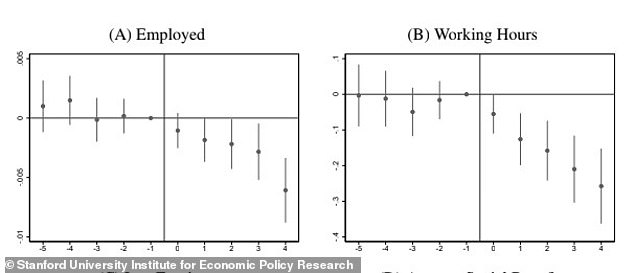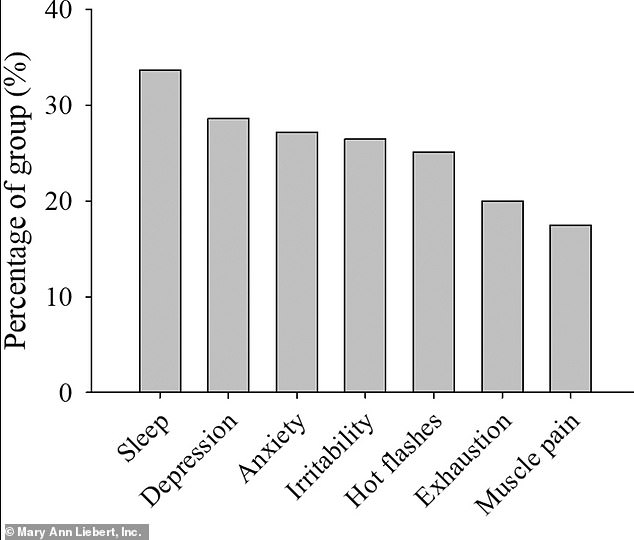
The menopause side effect millions of women experience but don’t talk about… ‘massive system failing’
Women bracing for menopause know to prepare for the hot flashes, mood swings and brain fog, but another side effect of ‘the change’ occurs outside of the body – and it is rarely spoken about.
New research from scientists in Norway and Sweden has found that a woman’s career, specifically her pay, suffers once menopause sets in. The financial penalty from menopause begins at diagnosis and intensifies over time.
The physiological and psychological effects of menopause are being studied in greater depth, but far less is known about the economics of the transition.
Menopause’s economic toll is most severe for women without a college degree, especially those in small, private-sector firms.
The penalty is also amplified for those working in the private sector, particularly in smaller companies and teams with a high proportion of older female colleagues.
Kacy Fleming, a psychologist and founder of The Fuchsia Tent, a firm dedicated to women’s workplace well-being, told the Daily Mail: ‘The 10 percent earnings drop in symptomatic peri/menopausal women reveals a massive system failing; both healthcare and organizations need to step up.’
In Norway, a menopause diagnosis led to a 10 percent reduction in earnings within four years, a consequence of women scaling back their hours or leaving their careers early.
The scale of this ‘menopause penalty’ was comparable to other major economic setbacks, such as job displacement.
Menopause doesn’t just lead to sick days; it forces permanent work reductions. This is proven by a sharp rise in women relying on disability insurance, which drives the persistent earnings drop (stock)
Lauren Darisse, COO and General Counsel of The HRT Club, which creates and sells effective and affordable hormone replacement therapy (HRT), told the Daily Mail: ‘These new economic figures highlight a persistent, sad reality: women are often stigmatized for experiencing symptoms like hot flashes and their visible effects.
‘Workplaces must create an environment of understanding and support, helping women thrive rather than feel sidelined during this natural life stage.’
Stanford researchers used Scandinavian population data to demonstrate that menopause directly causes a loss of earnings. By comparing newly diagnosed women to their undiagnosed peers, they isolated menopause as the cause of the economic penalty.
About 20 percent of the US labor force are women nearing or in menopause.
A Swedish natural experiment included in the Stanford report proved that timely diagnosis and HRT treatment can prevent economic loss. When women accessed care, their earnings losses were significantly smaller.
For women who did not receive adequate treatment, earnings fall by 10 percent within four years, driven by a steady reduction in work hours and exits from the labor force.
The study confirmed the penalty is preventable. When women received timely treatment like HRT, they had less earnings losses, proving the economic toll is a direct result of inadequate healthcare and support.
Their study was published by the Stanford University Institute for Economic Policy Research.

Figure A shows a persistent decline in employment post-diagnosis, indicating a long-term workforce detachment. Figure B confirms a sustained reduction in work hours, proving the earnings penalty hits on both the extensive (leaving jobs) and intensive (reducing hours) margins
Fleming added: ‘With women responsible for roughly 80 percent of consumer spending power, this downtrend in our income does not bode well for the global economy.’
Menopause marks the end of a woman’s reproductive years through a significant decline in key hormones. This change generates a wide range of symptoms, including hot flashes, sleep disruption and cognitive difficulties.
While a universal experience for women who live long enough, its timing, duration and severity are unique to each woman, creating a highly personal yet universal health evolution..
And the US workplace offers no safety net for menopause, forcing some women to rely on disability insurance.
Petra Persson, a faculty fellow at the Stanford Institute for Economic Policy Research (SIEPR) who led the research said: ‘We have parental leave policies, and we have policies that support workers when their productivity dips for health reasons, so it makes sense to also have policies that help women during the menopause transition.’

The chart shows the symptoms reported by 374 women in a 2023 study by American public health researchers
The lack of accommodations or resources for women in menopause forces experienced employees to cut hours or leave careers due to a lack of basic.
Fleming said: ‘By not providing adequate support for midlife women, companies are basically throwing 20 years of strategic thinking, organizational knowledge, and problem solving out the door.
‘From a lost productivity perspective, the numbers are staggering; we’re looking at $150 billion in global productivity losses and over $600 billion in healthcare costs.’
She argued that the disability exit path frames menopause as an individual’s failing, burdening the woman and absolving the company of support, despite the condition being highly treatable.
Fleming said: ‘It’s maddening when we know that most hormone replacement therapies have been around for years and cost pennies on the dollar.’
Amy Epstein Gluck, a workplace compliance and ADA expert who chairs the Employment practice at Pierson Ferdinand, told the Daily Mail: ‘For women, symptoms of perimenopause or menopause often begin when they are at the top of their game and at the peak of their earning years, which can derail them without accommodations.’
Gluck said: ‘While menopause, alone, is not a disability under the Americans with Disabilities Act (ADA), its symptoms can lead to limitations on major life activities that warrant accommodations.
‘If employers don’t offer some practical accommodations like temperature control, flexible scheduling, remote options, rest breaks, leave for treatment, role modifications, workers with treatable menopause symptoms may still be pushed toward disability rather than supported to remain.’
And Fleming added: ‘It’s not the biology that’s disabling; it’s the lack of information, treatment access and workplace support.’
First Appeared on
Source link






